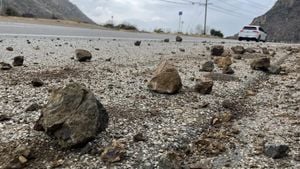The global conversation on climate change takes on new urgency as the 29th Conference of the Parties to the UN Framework Convention on Climate Change (COP29) gathers momentum this week in Baku, Azerbaijan. With over 600 million smallholder farmers responsible for producing nearly one-third of the world’s total food supply, there is growing pressure to support these farmers who are increasingly vulnerable to climate volatility.
At the heart of COP29, discussions are particularly heated on the often-overlooked need for financial support for agriculture. Current figures suggest small farmers receive less than 1% of the climate financing designated for climate action, leaving them ill-equipped to combat and adapt to the challenging climate conditions spurred by global warming. Reports from the Climate Policy Initiative highlight this gap, indicating countries collectively need around $1 trillion for comprehensive climate action to fight the growing threat from climate change—a number starkly at odds with the much lower amounts wealthy nations are willing to contribute.
Esther Penunia, secretary general of the Asian Farmers Association, raised poignant questions at COP29, asking, “You don’t help small farmers, where will you get your food? Who will farm for you?” Her thoughts reflect the anguish of many farmers who risk losing not just their livelihoods but also contribute significantly to global efforts to sustain food security.
Smallholder farmers play a unique and complex role within the food systems, which are responsible for about one-third of global greenhouse gas emissions. The urgency of climate financing for these farmers ties directly back to the potential they have to mitigate emissions through improved agricultural practices.
At the conference, advocacy groups like the Consultative Group on International Agricultural Research (CGIAR) and the Food and Agriculture Organization (FAO) are leading discussions to shed light on the important intersection of agriculture and climate change. They are also developing strategies aimed at reducing emissions through climate-smart agricultural practices. Ismahane Elouafi, CGIAR’s executive director, was quoted saying, "If we want to solve the issue, how could we not invest in a sector (agriculture) that's responsible for one-third of the problem?"
Elouafi’s statement captures the crux of the debate surrounding funding allocations, especially as climate talks continue. The core concern hinges on how much of the climate funding should be directed toward innovative sustainable agricultural practices as opposed to simply mitigating fossil fuel emissions.
This new focus on agriculture was mirrored during the Agriculture Innovation Mechanism for Scale (AIM for Scale) presentations, where initiatives to fund weather forecasting tools aimed at helping farmers adapt to climate change were unveiled. The weather services which could channel over $1 billion to farmers across Asia, Africa, and Latin America intend to co-produce weather forecasts beneficial for farm planning, enhancing resilience against the unpredictable nature of climate patterns.
On the ground at COP29, DeSmog’s analysis revealed another layer of complexity—over 204 lobbyists from the industrial agriculture sector attended the talks, raising red flags about the influence of agri-business on climate decisions. With fossil fuel lobbyists already under scrutiny for their influence, the embedding of big agriculture firms alongside them raises concerns about the dilution of climate action objectives.
Rachel Sherrington from DeSmog explained, “Big Agriculture has a powerful and sustained presence within the UNFCCC and at the heart of global climate decision-making.” Groups like JBS, one of the largest meat companies, continue sending representatives to the conferences, drawing attention away from the voices and concerns of smallholders like Penunia.
Echoing these concerns, Penunia emphasized the urgent need to hear the voices of farmers. With extreme weather conditions wreaking havoc on crops globally, investing in smallholder agriculture could become the key to tackling climate change. "You don’t help small farmers, where will you get your food?" she questioned once more, highlighting the dependence on local food systems represented by the millions working the land.
While some countries and investors are stepping up—like the recent $9 billion investment announced at COP28 focused on agricultural innovations—there remains clear skepticism on whether this financial commitment will trickle down to the smallholder farmers who sustain rural economies and food supply chains.
Despite the promises of big funds, there are genuine fears about the effectiveness and reach of climate initiatives. Zeke Hausfather, research scientist at Berkeley Earth, cautioned about the limitations of land management changes to reduce global carbon dioxide emissions, emphasizing, "the amount of carbon sequestration achieved through practices isn't guaranteed to remain permanent." Therefore, funding for agricultural adaptation is seen not merely as supplementary but necessary for the future resilience of food systems.
With each year, the stakes grow higher for smallholder farmers, underpinning the significant need for their voices to be prioritized within climate decision-making arenas. At COP29, many are hopeful—yet cautious—that governments worldwide will recognize the undeniable link between agriculture and climate change and pivot toward supporting smallholder farming as part of the wider climate strategy. “Our role is absolutely key,” Penunia stated, encapsulating the poignant struggle to not only survive but thrive amid climate uncertainty.
The outcomes of COP29 should signal whether the collective global commitment can translate to meaningful action for those at the grassroots level—especially the farmers who, quite literally, are sowing the seeds for tomorrow’s food security.



